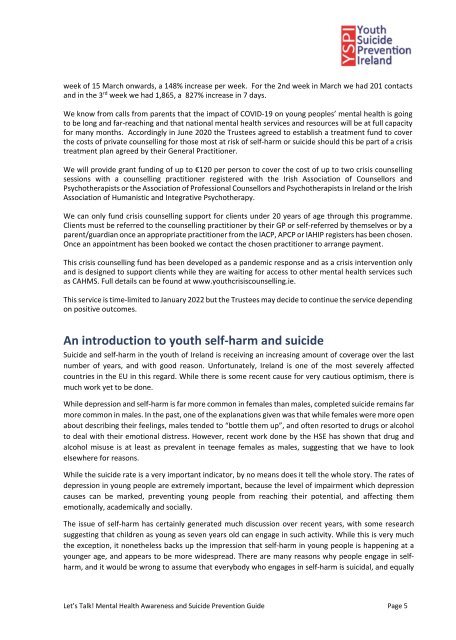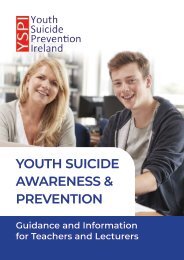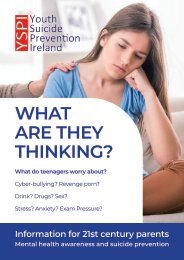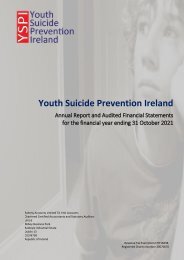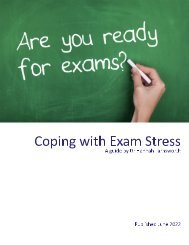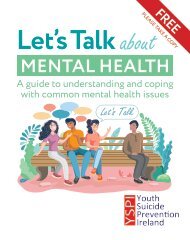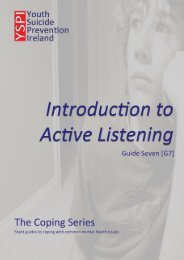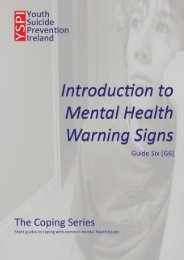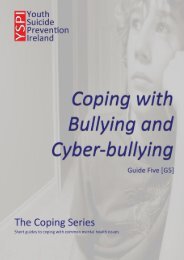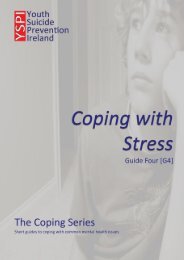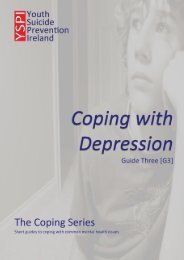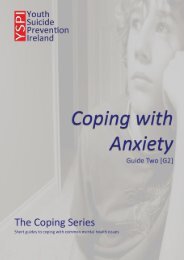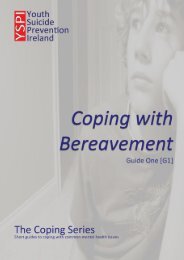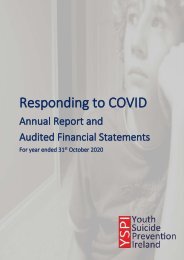Let's Talk Guide 2021
A new guide to mental health awareness and suicide prevention.
A new guide to mental health awareness and suicide prevention.
- No tags were found...
Create successful ePaper yourself
Turn your PDF publications into a flip-book with our unique Google optimized e-Paper software.
week of 15 March onwards, a 148% increase per week. For the 2nd week in March we had 201 contacts<br />
and in the 3 rd week we had 1,865, a 827% increase in 7 days.<br />
We know from calls from parents that the impact of COVID-19 on young peoples’ mental health is going<br />
to be long and far-reaching and that national mental health services and resources will be at full capacity<br />
for many months. Accordingly in June 2020 the Trustees agreed to establish a treatment fund to cover<br />
the costs of private counselling for those most at risk of self-harm or suicide should this be part of a crisis<br />
treatment plan agreed by their General Practitioner.<br />
We will provide grant funding of up to €120 per person to cover the cost of up to two crisis counselling<br />
sessions with a counselling practitioner registered with the Irish Association of Counsellors and<br />
Psychotherapists or the Association of Professional Counsellors and Psychotherapists in Ireland or the Irish<br />
Association of Humanistic and Integrative Psychotherapy.<br />
We can only fund crisis counselling support for clients under 20 years of age through this programme.<br />
Clients must be referred to the counselling practitioner by their GP or self-referred by themselves or by a<br />
parent/guardian once an appropriate practitioner from the IACP, APCP or IAHIP registers has been chosen.<br />
Once an appointment has been booked we contact the chosen practitioner to arrange payment.<br />
This crisis counselling fund has been developed as a pandemic response and as a crisis intervention only<br />
and is designed to support clients while they are waiting for access to other mental health services such<br />
as CAHMS. Full details can be found at www.youthcrisiscounselling.ie.<br />
This service is time-limited to January 2022 but the Trustees may decide to continue the service depending<br />
on positive outcomes.<br />
An introduction to youth self-harm and suicide<br />
Suicide and self-harm in the youth of Ireland is receiving an increasing amount of coverage over the last<br />
number of years, and with good reason. Unfortunately, Ireland is one of the most severely affected<br />
countries in the EU in this regard. While there is some recent cause for very cautious optimism, there is<br />
much work yet to be done.<br />
While depression and self-harm is far more common in females than males, completed suicide remains far<br />
more common in males. In the past, one of the explanations given was that while females were more open<br />
about describing their feelings, males tended to “bottle them up”, and often resorted to drugs or alcohol<br />
to deal with their emotional distress. However, recent work done by the HSE has shown that drug and<br />
alcohol misuse is at least as prevalent in teenage females as males, suggesting that we have to look<br />
elsewhere for reasons.<br />
While the suicide rate is a very important indicator, by no means does it tell the whole story. The rates of<br />
depression in young people are extremely important, because the level of impairment which depression<br />
causes can be marked, preventing young people from reaching their potential, and affecting them<br />
emotionally, academically and socially.<br />
The issue of self-harm has certainly generated much discussion over recent years, with some research<br />
suggesting that children as young as seven years old can engage in such activity. While this is very much<br />
the exception, it nonetheless backs up the impression that self-harm in young people is happening at a<br />
younger age, and appears to be more widespread. There are many reasons why people engage in selfharm,<br />
and it would be wrong to assume that everybody who engages in self-harm is suicidal, and equally<br />
Let’s <strong>Talk</strong>! Mental Health Awareness and Suicide Prevention <strong>Guide</strong> Page 5


